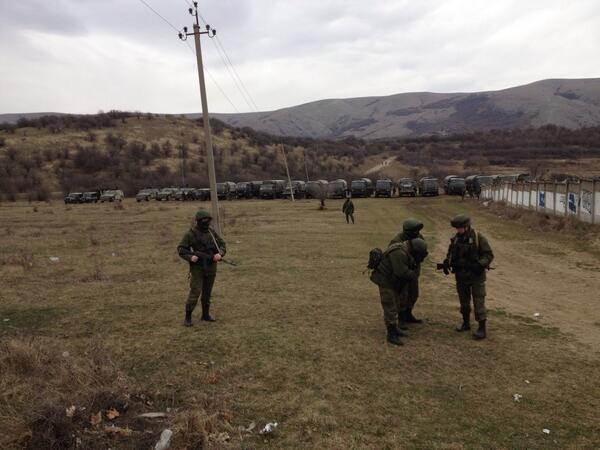Russia said Monday it had ordered troops near the border with Ukraine to return to their bases, just days ahead of a crucial presidential vote aimed at bringing the country out of deep crisis.
In a move that could ease tensions, President Vladimir Putin’s office said he had ordered thousands of troops deployed in border regions to return to barracks after the end of spring exercises.
However, NATO said it saw no proof Russia had begun withdrawing, and noted this was the third time Putin had made such a claim.
The Kremlin said Putin had also demanded that Ukraine’s pro-Western government halt its military operation against insurgents in the east and pull out its troops.
His remarks came amid continued fighting in eastern Ukraine, with at least one soldier reported killed in a pre-dawn attack near the flashpoint rebel town of Slavyansk.
“Due to the end of the planned spring training of troops that included their movement to Rostov, Belgorod, and Bryansk regions, the Russian president ordered… troops participating in the drills to return to their permanent bases,” the Kremlin said in a statement after a meeting of the country’s Security Council.
Putin also called for an immediate end to the offensive by Ukrainian troops in the east — describing it as a “punitive operation” against the separatists — and their withdrawal.
‘No evidence of pullback’
The presence of the Russian troops near the border raised deep concerns after Putin’s annexation of Crimea in March and the uprising by well-armed pro-Moscow rebels in Ukraine’s eastern coal and steel heartland.
NATO, which has repeatedly expressed worries about the estimated 40,000 troops, said it had not seen “any evidence at all” indication they were returning to their bases.
Putin said earlier this month that the troops had been moved away from the border to regional bases to continue planned training exercises. NATO at the time also said it had seen no evidence of a withdrawal.
Ukraine also Monday called on Moscow to cancel air force exercises planned for May 21-25 near the border, saying they will “fuel tensions” during Sunday’s election.
Under pressure from US and European Union sanctions, Moscow has moved to reduce tensions with Ukraine after months of crisis that sent relations with the West to their lowest point since the Cold War.
After initially dismissing Sunday’s presidential vote — called after February’s ouster of Kremlin-backed president Viktor Yanukovych — Putin recently said it was a step in the right direction.
Preparations were continuing Monday for the vote, seen in the West as the only way to end a crisis that began with pro-EU protests in Kiev but spiralled into a wider confrontation.
Prime Minister Arseniy Yatsenyuk acknowledged it could be difficult to organise the election in some districts in the east.
But he added: “It affects very few areas and will not have any influence on voting. The election will take place and we will have a legitimate president.”
Still, it remains unclear how much credibility the vote will have as fighting continues between Ukrainian troops and rebels who have grabbed over a dozen towns and declared sovereignty in the industrial hubs of Donetsk and Lugansk.
The Ukrainian defence ministry said one soldier was killed and three others injured when rebels staked out in a kindergarten shelled a military checkpoint near Slavyansk on Monday.
“The terrorists, acting in their usual cynical and insidious manner, launched the attack from a kindergarten near the railway station,” it said in a statement. “They wanted to provoke the servicemen into trying to destroy the kindergarten.”
Ukraine’s military launched its offensive against the rebels in mid-April but has failed to oust them from their strongholds and suffered a number of humiliating setbacks.
Violence has flared almost nightly in various hotspots across the east, where the United Nations says the crisis has already cost more than 120 lives.
– Putin hails ‘first contacts’ –
Putin on Monday also praised “the first contacts between Kiev and supporters of federalization” during weekend talks in the eastern city of Kharkiv.
Moscow has demanded authorities in Kiev engage with separatists under a roadmap drawn up by the Organization for Security and Cooperation in Europe (OSCE), an East-West security body.
Saturday’s talks involved a broad range of figures, including pro-Russians, but no separatist leaders after Kiev refused to invite what they describe as “terrorists” to the table.
Regional officials said further talks will be held on Wednesday in Donetsk.
Washington and its allies have threatened further sanctions if Russia disrupts Sunday’s vote, which will see around 20 hopefuls vying for the country’s top post.
The clear front-runner is Petro Poroshenko, a billionaire chocolate baron who was once a minister in the Yanukovych regime but became the chief financier of the so-called Maidan protests against his rule.
Opinion polls give him around 34 percent of the vote, far ahead of the deeply divisive former prime minister Yulia Tymoshenko, the one-time darling of the 2004 Orange Revolution who was released from jail in February.










